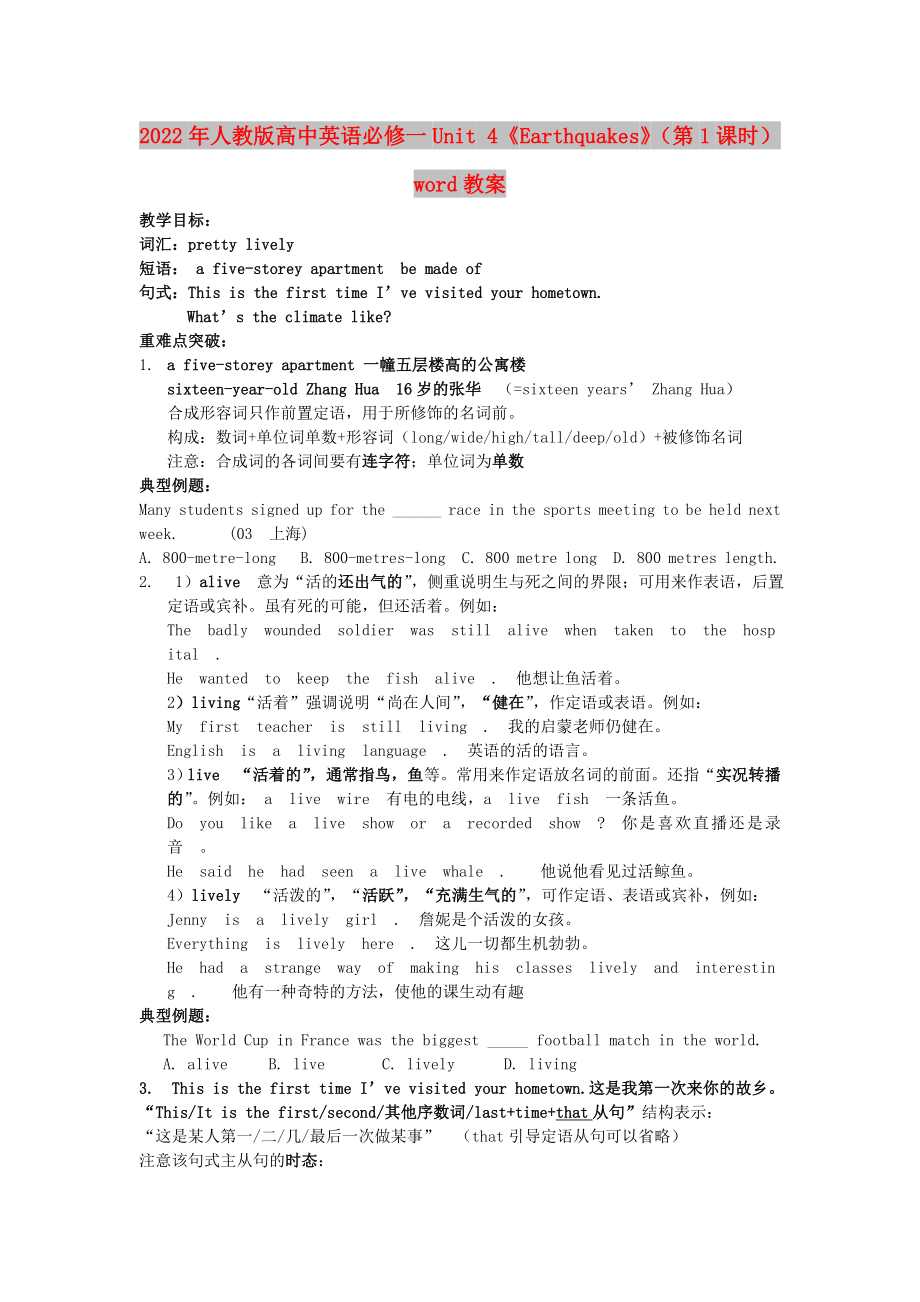《2022年人教版高中英語必修一Unit 4《Earthquakes》(第1課時(shí))word教案》由會員分享,可在線閱讀���,更多相關(guān)《2022年人教版高中英語必修一Unit 4《Earthquakes》(第1課時(shí))word教案(2頁珍藏版)》請?jiān)谘b配圖網(wǎng)上搜索����。
1�����、2022年人教版高中英語必修一Unit 4《Earthquakes》(第1課時(shí))word教案
教學(xué)目標(biāo):
詞匯:pretty lively
短語: a five-storey apartment be made of
句式:This is the first time I’ve visited your hometown.
What’s the climate like?
重難點(diǎn)突破:
1. a five-storey apartment 一幢五層樓高的公寓樓 sixteen-year-old Zhang
2���、Hua 16歲的張華 (=sixteen years’ Zhang Hua) 合成形容詞只作前置定語��,用于所修飾的名詞前����。 構(gòu)成:數(shù)詞+單位詞單數(shù)+形容詞(long/wide/high/tall/deep/old)+被修飾名詞 注意:合成詞的各詞間要有連字符�����;單位詞為單數(shù)
典型例題:
Many students signed up for the __
3�����、____ race in the sports meeting to be held next week. (03 上海)
A. 800-metre-long B. 800-metres-long C. 800 metre long D. 800 metres length.
2. 1)alive?意為“活的還出氣的”�,側(cè)重說明生與死之間的界限;可用來作表語�����,后置定語或賓補(bǔ)���。雖有死的可能�,但還活著�。例如:
The?badly?wounded?soldier?was
4、?still?alive?when?taken?to?the?hospital?.
He?wanted?to?keep?the?fish?alive?.?他想讓魚活著�����。
2)living“活著”強(qiáng)調(diào)說明“尚在人間”�����,“健在”�����,作定語或表語。例如:
My?first?teacher?is?still?living?.?我的啟蒙老師仍健在���。
English?is?a?living?language?.?英語的活的語言�。
3)live?“活著的”����,通常指鳥,魚等�。常用來作定語放名詞的前面。還指“實(shí)況轉(zhuǎn)播的”�����。例如: a?live?wire?有電的電線�,a?live?fish?一條
5、活魚��。
Do?you?like?a?live?show?or?a?recorded?show???你是喜歡直播還是錄音?�。
He?said?he?had?seen?a?live?whale?.??他說他看見過活鯨魚。
4)lively?“活潑的”��,“活躍”,“充滿生氣的”���,可作定語、表語或賓補(bǔ)����,例如:
Jenny?is?a?lively?girl?.?詹妮是個(gè)活潑的女孩。
Everything?is?lively?here?.?這兒一切都生機(jī)勃勃���。
He?had?a?strange?way?of?making?his?classes?lively?and?interes
6�����、ting?.??他有一種奇特的方法�����,使他的課生動(dòng)有趣
典型例題:
The World Cup in France was the biggest _____ football match in the world.
A. alive B. live C. lively D. living
3. This is the first time I’ve visited your hometown.這是我第一次來你的故鄉(xiāng)��。
“This/It is the first/second/其他序數(shù)詞/last+time+that從句”結(jié)構(gòu)表示:
“這是某人第一/二
7�����、/幾/最后一次做某事” (that引導(dǎo)定語從句可以省略)
注意該句式主從句的時(shí)態(tài):
主句用is���,定語從句用現(xiàn)在完成時(shí)���;主句用was,從句用過去完成時(shí)�。
典型例題:This was the first time I _____ a snake.
A. saw B. have seen C. see D. had e across
4. What’s the climate like? 氣候怎么樣?
“What be+主語+like�����?”結(jié)構(gòu)是詢問某人某事狀況的習(xí)慣用語�。
主語是人時(shí),可以詢問其內(nèi)在品質(zhì)��,也可以詢問其外貌特征���,回答時(shí)可以針對其兩方面或一方面�����。
8��、
小結(jié):詢問某人或某事狀況可以用以下方式
What be +主語+like�?/What do you think of…�?/How do you like(find)…?
指點(diǎn)迷津:
How much do +主語+like…�����? 某人多么喜歡……����?
What do+主語+like����? 某人喜歡什么�?
What do+主語+look like? 某人長什么樣?(著重問外表特征)
主語+would like to do=主語+feel like doing 某人愿意做 (表示意愿)
How be +主語��? 某人身體或某事怎么樣�����?(詢問人著重健康狀況)
典型例題:
9���、—______?
—He is kind but strict.
A. What does your new headteacher look like?
B. How is your new headteacher
C. What is your new headteacher like?
D. How much do you like your new headteacher?
強(qiáng)化訓(xùn)練:
1. He used to live in ______ .
A. a six-storeys building B. a building of six floored
C.
10�����、 a six-floors’ building D. a building of six storey
2. His grandfather is the only soldier ______ after the war was over.
A. live B.living C. alive D.lovely
3. The discussion came _____ when an interesting topic was brought in.
A.living B. live C. alive D. to live
4. —W
11�����、hat a pity! I haven’t got a ticket for the football match.
—Don’t worry.It’ll be broadcast _______ .
A.live B. lively C. alive D. living
5. —How do you like the performance tonight?
—______ .
A. Not at all. B. Oh,not very boring.
C. No,I didn’t like it D. Yes,I’m very interested in it.
6. She was scolded because that was the third time that she ____ late to work.
A. has been B. had e C. been D. has e
7. —Do you know my town at all?
—No,this is the first time I _____ here.
A. was B. have been C. came D. am ing
 2022年人教版高中英語必修一Unit 4《Earthquakes》(第1課時(shí))word教案
2022年人教版高中英語必修一Unit 4《Earthquakes》(第1課時(shí))word教案

